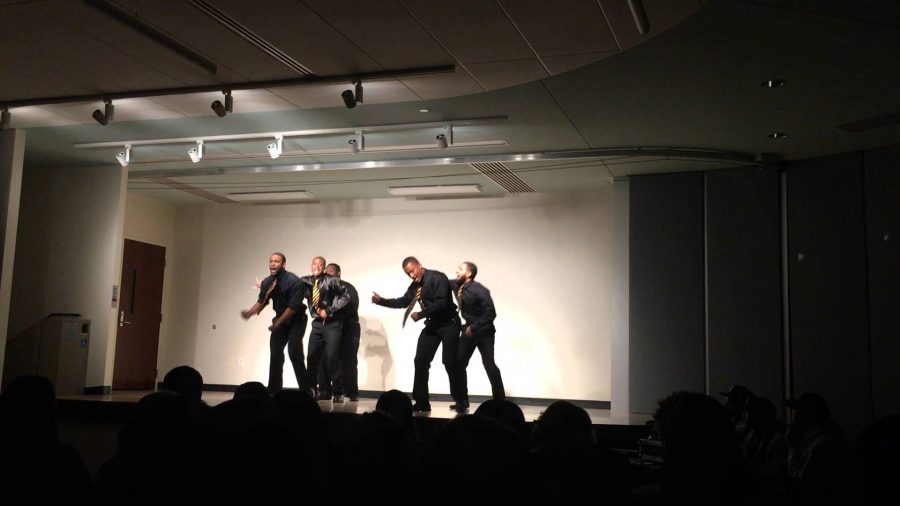Nine historically black greek organizations stepped and strolled their way to the end of a weeklong celebration.
By Cassandra Santiago
[email protected]
It’s no secret. Shade was thrown in every direction on the small stage of Petersen Hall’s Multipurpose Room on Feb.27. Some shots were subtle; some shots were bold enough to send the energetic crowd into a frenzy. Nonetheless, five of the seven historically black organizations on campus ended their National Panhellenic Council Week with a clapping and stomping bang.
The showcase was the last event in a weeklong celebration and recognition of the council’s history of culture, tradition, activism, and excellence at the University of Iowa. The nation’s council oversees the nine historically black Greek-letter organizations known collectively as the Divine Nine.
The lights dimmed, leveling off the bustle of the room, and the host of the evening began with a casual tone. First up on the agenda was roll call, an opportunity for every Divine Nine sorority and fraternity to voice short sounds of the organization. After a quick music throwback, the men of the Alpha Theta chapter of Alpha Phi Alpha, the oldest fraternity, took the stage.
Using their feet, hands, and voices, five members of the Alphas commanded the attention of the audience. They were showcasing a significant part of black Greek life, stepping and strolling. At a university with a white student population of nearly 84 percent, public displays of the Divine Nine’s culture are critical, said Zeta Phi Beta Sorority President Rachael Hale.
[youtube id=”5wtL1Z55fsc” mode=”normal”]
“You run into a lot of situations where people see things on television or in a video and they mock it or imitate it because they’re uneducated on it,” she said. “Most times you find that it’s not intentionally being done. You try to approach the situation with cautiousness. You try to let them know why this is so important and sacred to your organization.”
The tradition, brought to the U.S. by slaves from Africa, was a form of storytelling and later served as entertainment on Sundays, break days. Stepping consists of synchronized body movements such as clapping, stomping, and slapping body to parts to create a unified sound. It is usually accompanied by chanting or singing. Strolling is less rigid and more dancelike, performed in a line.
After the Alphas, the women of the Epsilon Theta chapter of Alpha Kappa Alpha took the stage, subtly hinting that their sorority “runs the yard.” They listed their accomplishments, intertwined with nationally recognized Alpha Kappa Alpha songs. The women of the Delta chapter of Delta Sigma Theta used a similar tactic but added in a skit. An intermission was called after the Delta performance.
Then an insanely entertaining dance competition held the audience captive until a short, unexpected preview of an upcoming greek new member showcase stole the crowd’s attention. After the intermission, the men of the Kappa Psi chapter of Phi Beta Sigma also took the skit route, labeling their performance “the heist.”
Last, the women of the Pi Kappa chapter of Zeta Phi Beta opted for slow dancing, stepping, and chanting to end the night. And despite the shade cakes served through song, skits, chants, and moves, the event’s purpose was to display the pride, culture, and history of each organization.
“As an adviser, it’s nice to see them come together as a community,” said Panhellenic Council adviser Gina Marino. “With such a small community, they have such a large impact on this campus. There’re hundreds of people who come to their events. There weren’t any seats left, so that’s always great for them.”



